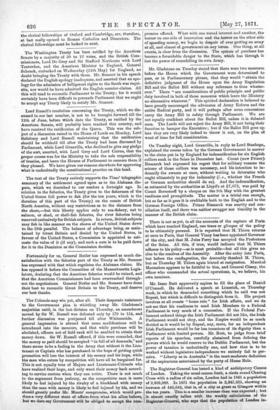The Colonels may win yet, after all. Their desperate resistance
to the Government plan is whittling away Mr. Gladstone's majorities until, in the last division on Thursday, an amendment moved by Sir W. Russell was defeated only by 170 to 154, and further discussion was postponed till after Whitsuntide. A general impression is abroad that some modifications will be introduced into the measure, and that while purchase will be abolished, officers not of field rank will be enabled to obtain their money down. Sir W. Russell offered, if this were conceded, that the money so paid should be accepted "in full of all demands," and there seems to be a feeling in the Army that without it the Lieu- tenant or Captain who has purchased in the hope of getting quick promotion will lose the interest of his money and his hope, while the man who enters by competition will have all he bargained for. This is not equally true of Majors and Lieutenant-Colonels who have realized their hope, and only want their money back accord- ing to service custom when they can retire. There is not much in the argument from jealousy, as the competitive man is more likely to feel injured by the rivalry of a blockhead with money than the man with money is likely to feel injured by his, and we should greatly prefer Mr. Muntz' compromise, which would pro- duce a very different state of affairs from what his allies believe, but we dare say Government will be obliged to accept the coin-
promise offered. What with one vested interest and another, the horror on one side of innovation and the horror on the other side of spending money, we begin to despair of ever getting an army at all, and almost of government on any terms. One thing, at all events, is clear from the discussion. The system of purchase has become a formidable danger to the State, which has through it. lost the power of remodelling its own Army.


































 Previous page
Previous page